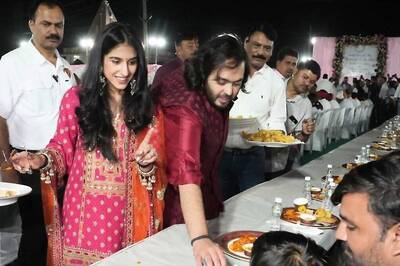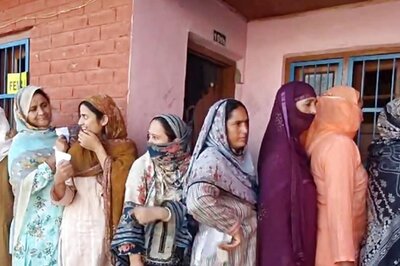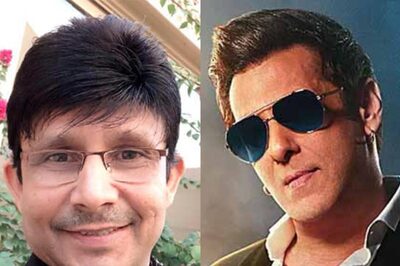
views
Union Road Transport and Shipping Minister and senior Bharatiya Janata Party (BJP) leader Nitin Gadkari’s fate will be sealed today as Nagpur goes for polls, along with six other constituencies of Vidarbha region of Maharashtra. Known for his considerable goodwill and someone who has ‘delivered’, Gadkari is one of the most important leaders in the Narendra Modi government.
In Nagpur, Gadkari faces Congress candidate Nana Patole, a former BJP MP from Bhandara-Gondiya. Considered to be one of the toughest of the fights in Maharashtra, Patole is fielded by the Congress party against Gadkari to get back the party’s stronghold. On the other side, the orange city of Nagpur also houses the headquarters of RSS, which makes it all the more important for the BJP to win.
A bitter Narendra Modi critic, Patole had quit the BJP in December 2017 and joined the Congress in January last year. A name to reckon with in his own right, Patole is considered an outsider in Nagpur but many poll pundits say it won’t be a cakewalk for Gadkari this time around.
Of Nagpur’s 22 lakh voters, Dalits, Muslims and Kunbis account for almost 12 lakh. Patole belongs to the Kunbi community. Nagpur also has almost 4.8 lakh Scheduled Caste voters. About 3.60 lakh of them are Buddhists. The constituency also houses 1.75 lakh Scheduled Tribe voters. Among them, the Halba community accounts for more than 90,000 voters. Halbas claim to be a Scheduled Tribe, but are not given caste certificates. Gadkari had promised to solve this issue after getting elected in 2014.
However, Gadkari has used his high-profile Union ministry of road transport, highways, shipping and water resources to give Nagpur city a visible developmental and infrastructural facelift. The first phase of the Nagpur Metro was also recently opened, just in time before the elections. Majhi Metro — a 8,680 crore mass rapid transit project — will run 41 kilometres on east-west and north-south corridors in the first phase.
Earlier, Patole had contested from Bhandara-Gondiya Lok Sabha constituency in 2014, defeating former Union minister Praful Patel of the NCP with a margin of 1,49,254 votes (12.5 per cent). Patel was a four-time Lok Sabha MP from the state of Maharashtra. He is an ardent supporter of the Vidarbha statehood movement, and had earlier raised the issue through a private member’s bill in Parliament
However, as the spotlight remains on Gadkari this time around as well, a quick look at the poll history of Nagpur shows that the constituency that houses the RSS headquarters has often sided with the Congress.
BJP’s Gadkari contested the Lok Sabha polls in 2014 from Nagpur and won the seat, ousting four-time Congress MP Vilas Muttemwar. Gadkari won with a margin of 2, 84,828 votes, which accounted to 26.3 per cent of the total votes polled. His winning feat led to the loss of one of the stronghold constituencies for the Congress party.
Vilas Muttemwar of the Congress first won the seat in the year 1998 against BJP candidate Ramesh Mantri with a margin of 19.1 per cent (1,63,282 votes). Later, he continued the winning streak for the next three elections in 1999, 2004 and 2009. He won the seat by margins of 8.8 per cent, 12.6 per cent and 3.2 per cent vote share, respectively. BJP, which fielded four different candidates in these four elections, remained a consistent first runner-up.
The last time BJP had won Nagpur before Gadkari’s victory in 2014 was during the year 1996 when Banwarilal Purohit contested on the saffron party’s ticket. He defeated Kunda Avinash Vijaykar of Congress with a 15.5 per cent margin.
It is important to mention that Purohit was a two-time Congress MP from the same constituency in the year 1984 and 1989, but later went on to join the BJP. Earlier, Purohit had defeated Kukreja Arjundas of the BJP in 1989 and Shyam Khobragade of RPI (Khobragade) in 1984. Meanwhile in 1991, Purohit lost to Dattaji Meghe of Congress when he first contested on a BJP ticket.
Jambuwantrao Dhote, one of the crusaders of Separate Vidarbha Movement, was also a two-time MP from Nagpur. He had won on a Congress ticket in 1980 to become second-time MP of Nagpur defeating Shyam Khobragade of RPI with a huge margin of 27.2 per cent. He first contested in 1971 as a Forward Bloc candidate and won against Congress candidate Rikhabchand Sharma. During those elections, Sharma lost to Dhote by a mere 0.6 per cent of margin. The difference between votes of two candidates was just 2,056.
Before Dhote, Gev Awari won the seat for Congress in 1977 by defeating Bhaurao Khobragade. NR Deoghare fetched a victory for Congress in 1967 after a loss in the previous elections, when one of the founders of the Congress, Madhav Shrihari Aney alias Bapu Aney, challenged the grand old party’s regime in the constituency in 1962. Aney won the seat contesting as an independent candidate with a margin of 13.9 per cent against the Congress candidate, Rikabchand Sharma.
During the first two Lok Sabha polls, Anusayabhai Kale held the seat of MP from Nagpur constituency. She contested as a Congress candidate in both the elections, winning with a staggering margin of almost 60 per cent each time.
All six assembly segments that fall in the Nagpur constituency are represented by the BJP right now, including Chief Minister Devendra Fadnavis’s Nagpur South West. Of 157 municipal corporators in Nagpur, 115 belong to the BJP.




















Comments
0 comment